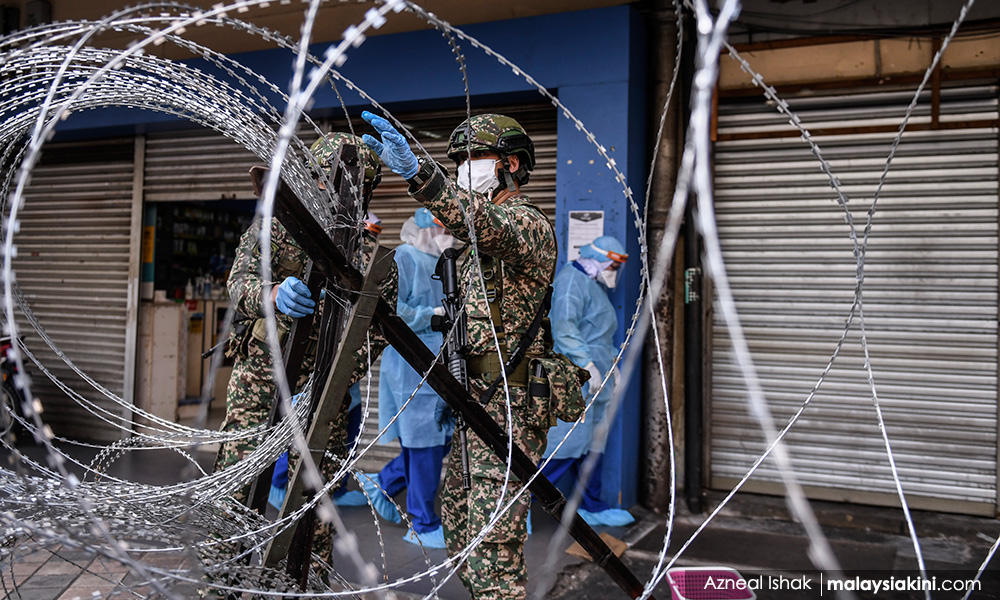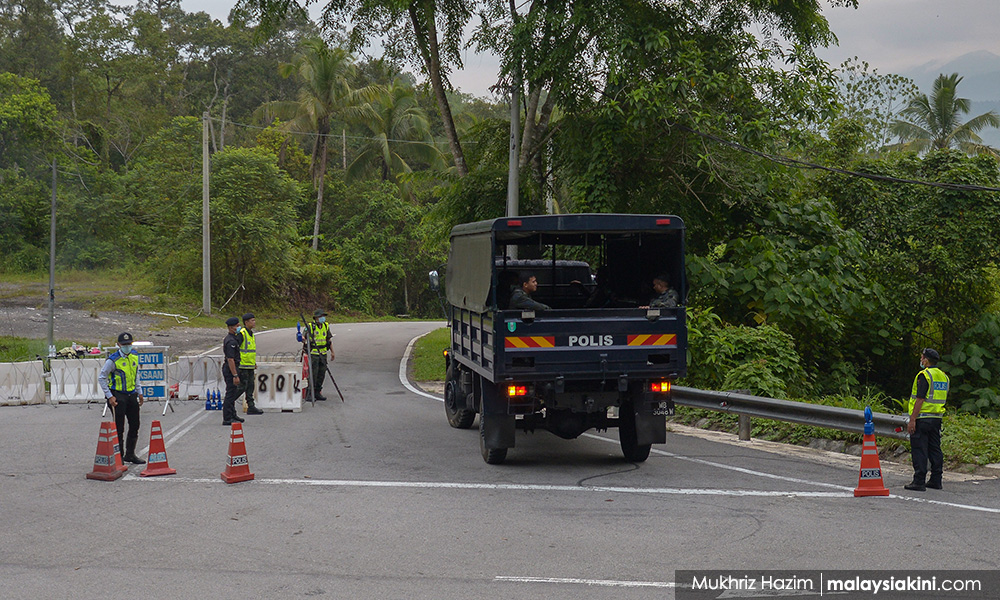COMMENT | Last week, there were two very different videos circulating, both featuring policemen in the outdoors during the movement control order (MCO).
The first showed a brave and compassionate police officer, who had taken the trouble to lower himself down into a deep drain, just to save a little black puppy who had fallen in. The puppy’s friends and family seemed so happy when the policeman was finally able to pick the puppy up and lift him out of the drain.
The second showed a police officer at a roadblock who was getting extremely angry and a boy who looked to be in his mid teens. The policeman shouted at the boy, who was standing still and offering no resistance, and then slapped him hard in the face.
There was another pair of images floating around the same time. One showed a soldier with his rifle, squatting down to gently pet a small little kitten.
Another was a photo of a small packet of food being passed through the barbed wire that separated the residents of Malaya Mansion from the outside world.
It has been said many times that crises bring out both the best and the worst in people. Law enforcement officers are no exception.
Surely there are many other untold tales of heroism, and many untold tales of abuses. There’s no way for someone like me to scientifically determine whether it’s 1 in 2, 10, 100 or a 1,000 who are the bad apples.
But even if it is 1 in 10,000, we still have a duty of care to address that 1 in 10,000, and try to protect the welfare of those who might be suffering abuse, just as we should work to protect the welfare of law enforcement officers - especially since many who do suffer abuse do not have an Instagram account with thousands of followers to make their voice heard.
Barbed wire and deaths in custody
The mostly foreign residents of Malaya Mansion come to mind in this case. If there were a group of any Malaysians who were being locked into their residences by such forceful and aggressive means such as barbed wire, so many of us would be up in arms.
The fact that these are foreign workers should not change the rights they are afforded as human beings. There seems to be no evidence to suggest that they deserve to be treated so harshly. They too are as much victims of this virus as any of the rest of us.
If a quarantine must be enforced so be it, but the violence suggested by a barbed wire truly helps no one, and only creates unnecessary additional stress and tension.

There are two more cases involving the police that should not be overlooked.
Again, as a caveat, for every one of these cases, who knows how many cases there are of heroism, compassion, and helpfulness on the part of the police.
The first case is a death in custody. 30 year old G Jestus Kevin was arrested on the 2nd of April for alleged theft. He was found dead in the Bentong police lockup on the 5th of April.
Those who have followed cases of deaths in custody over the years may understandably be concerned that this death may have been due to abuse or torture.
Given that the police stated that Kevin died of breathing difficulties, there is the added possibility that this case may be related to Covid-19 as well. If so, this raises the problem once again of whether lockups are becoming overcrowded during the MCO. It is heartening that the authorities have slowly started to realise that fines are a better way of punishing violations of the MCO, compared to detention.
Whatever the case, the authorities have a duty of care to anyone they detain. Once under detention, the health and safety of the detainee is 100% the responsibilities of the detainers.
It may be easy for some of us to turn a blind eye to how the police treat people some may think of as ‘criminal scum’. But take my word for it - not everyone who is detained is a criminal. Just like some may think they will never be the ones to catch Covid-19, you never know when it will be you or your loved one who is being locked up, for whatever valid or invalid reason.
Video recordings and preventing roadblock rap
The other alarming case was that of a police officer who was arrested on suspicion of having raped two Mongolian women who he had stopped at a roadblock.
There seems little to add to how shocking this alleged case and disgusting abuse of power is, except to say that it highlights the immense amount of power now being held by police officers manning roadblocks, with so much left to their discretion, and so much fewer means of oversight and accountability during the MCO.
We must absolutely give the police credit for acting quickly on this case, even to the point of raiding the hotel where the alleged crime had taken place to make the arrest.

That said as well, the same credit cannot be extended to the comment of the inspector general of police (IGP), who warned against making video recordings of the police at roadblocks.
The IGP has said some unprecedented and welcome things in the past, regarding the strictness of police discipline. In this case however, he does not seem to be on the right path.
As the nation’s top cop, should he not welcome any effort that may improve the performance of the police, and help to protect against cases like the rape of the two Mongolian women?
Video recordings are one of the few ways we have left during the MCO to ensure some measure of accountability, and prevent the abuse of power. Police in other countries are even made to wear body cameras, to ensure accountability.
Indeed, the IGP should be encouraging more video recordings of the police, to show that the vast majority of them are doing a good job - like the policeman who took the trouble to rescue the puppy from the drain.
If he is worried about what kind of police behaviour might be caught on camera, then perhaps he should address the problem of police behaviour, not the video recording thereof.
The government is failing the police
Of course, the blame can hardly be put on the police alone.
It is clear from some of these recordings that law enforcement is now being put under severe and extreme stress. Their actions sometimes seem to be symptomatic of lashing out due to stress.
I would imagine that a large part of that stress is coming from the appalling lack of clear guidelines from the government.
Over the last month, politicians seem to be falling over themselves making poorly thought out announcements, reversing those announcements, and sometimes reversing them again.
This lack of clear guidelines and detailed policies put a lot of stress on law enforcement, and sometimes leave too much to the interpretation of the police at roadblocks.
The whole idea of the ‘law’ in ‘law enforcement’ is that the law should be consistent. A law that is inconsistent is no law at all, and runs afoul of the very concept of law and order to begin with.
We don’t want a scenario where some local police insist that the public must wear masks in order to enter shops or restaurants, while police in other areas do not. This type of confusion causes even more unnecessary stress and tension between the public and law enforcement.
The government thus must put in as much effort as law enforcement who is sweating blood and tears on the ground, as well as the public themselves who are doing their best to play their part. They should come up with policies that are clear and consistent, and enable law enforcement to do their job properly - not create confusion that stresses both sides out, and opens the door to abuses of power.
This is a difficult time for all, and we want to give as few chances as possible for bad apples to ruin what is supposed to be a harmonious relationship between law enforcement and the public.
I have no doubt whatsoever that our police force is full to the brim with brave men and women, heroes doing their very best to protect a nation under attack by a dangerous virus. We owe it to them to always recognise the best, and to stop the bad from tainting their good work.
We thus urge the government to stop with publicity stunts, stop pushing advice with no scientific basis whatsoever, and start helping to formulate consistent, data-driven policies that will help everyone do their part properly to defeat Covid-19.
NATHANIEL TAN is a strategic communications consultant. He can be reached at [email protected].
The views expressed here are those of the author/contributor and do not necessarily represent the views of Malaysiakini.

